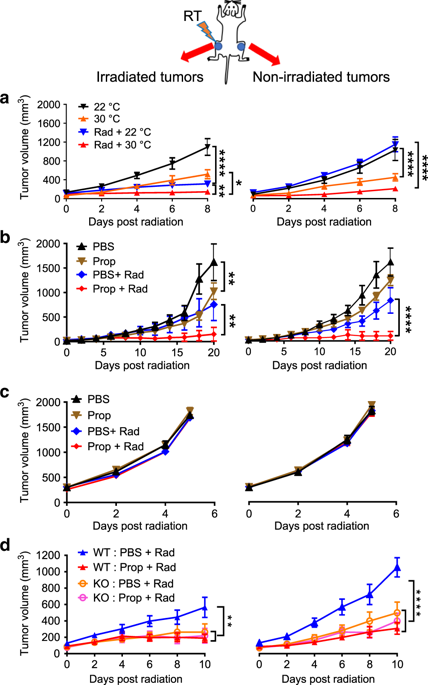当前位置:
X-MOL 学术
›
Nat. Commun.
›
论文详情
Our official English website, www.x-mol.net, welcomes your
feedback! (Note: you will need to create a separate account there.)
Adrenergic stress constrains the development of anti-tumor immunity and abscopal responses following local radiation.
Nature Communications ( IF 14.7 ) Pub Date : 2020-04-14 , DOI: 10.1038/s41467-020-15676-0 Minhui Chen 1 , Guanxi Qiao 1 , Bonnie L Hylander 1 , Hemn Mohammadpour 1 , Xiang-Yang Wang 2 , John R Subjeck 3 , Anurag K Singh 3, 4 , Elizabeth A Repasky 1
Nature Communications ( IF 14.7 ) Pub Date : 2020-04-14 , DOI: 10.1038/s41467-020-15676-0 Minhui Chen 1 , Guanxi Qiao 1 , Bonnie L Hylander 1 , Hemn Mohammadpour 1 , Xiang-Yang Wang 2 , John R Subjeck 3 , Anurag K Singh 3, 4 , Elizabeth A Repasky 1
Affiliation

|
The abscopal effect following ionizing radiation therapy (RT) is considered to be a rare event. This effect does occur more frequently when combined with other therapies, including immunotherapy. Here we demonstrate that the frequency of abscopal events following RT alone is highly dependent upon the degree of adrenergic stress in the tumor-bearing host. Using a combination of physiologic, pharmacologic and genetic strategies, we observe improvements in the control of both irradiated and non-irradiated distant tumors, including metastatic tumors, when adrenergic stress or signaling through β-adrenergic receptor is reduced. Further, we observe cellular and molecular evidence of improved, antigen-specific, anti-tumor immune responses which also depend upon T cell egress from draining lymph nodes. These data suggest that blockade of β2 adrenergic stress signaling could be a useful, safe, and feasible strategy to improve efficacy in cancer patients undergoing radiation therapy.
中文翻译:

肾上腺素能应激限制局部辐射后抗肿瘤免疫和远隔反应的发展。
电离放射治疗(RT)后的远隔效应被认为是罕见的事件。当与其他疗法(包括免疫疗法)联合使用时,这种效应确实会更频繁地发生。在这里,我们证明,单独放疗后发生远隔事件的频率高度依赖于荷瘤宿主的肾上腺素能应激程度。通过结合生理、药理学和遗传策略,我们观察到当肾上腺素能应激或通过 β-肾上腺素能受体的信号传导减少时,对受照射和未受照射的远处肿瘤(包括转移性肿瘤)的控制有所改善。此外,我们观察到抗原特异性抗肿瘤免疫反应得到改善的细胞和分子证据,这也取决于 T 细胞从引流淋巴结的排出。这些数据表明,阻断 β2 肾上腺素能应激信号传导可能是一种有用、安全且可行的策略,可提高接受放射治疗的癌症患者的疗效。
更新日期:2020-04-24
中文翻译:

肾上腺素能应激限制局部辐射后抗肿瘤免疫和远隔反应的发展。
电离放射治疗(RT)后的远隔效应被认为是罕见的事件。当与其他疗法(包括免疫疗法)联合使用时,这种效应确实会更频繁地发生。在这里,我们证明,单独放疗后发生远隔事件的频率高度依赖于荷瘤宿主的肾上腺素能应激程度。通过结合生理、药理学和遗传策略,我们观察到当肾上腺素能应激或通过 β-肾上腺素能受体的信号传导减少时,对受照射和未受照射的远处肿瘤(包括转移性肿瘤)的控制有所改善。此外,我们观察到抗原特异性抗肿瘤免疫反应得到改善的细胞和分子证据,这也取决于 T 细胞从引流淋巴结的排出。这些数据表明,阻断 β2 肾上腺素能应激信号传导可能是一种有用、安全且可行的策略,可提高接受放射治疗的癌症患者的疗效。






























 京公网安备 11010802027423号
京公网安备 11010802027423号